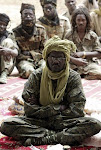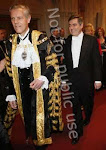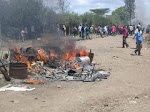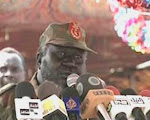"In free governments the rulers are the servants and the people their superiors and sovereigns" – Benjamin Franklin 1706-1790
Sovereignty could be defined as the power to do everything in a state without accountability, to make laws, to execute and to apply them, to impose and collect taxes and levy contributions, to make war or peace, to form treaties of alliance or of commerce with foreign nations, and the like, (http://etext.virginia.edu/jefferson/quotations/jeff0300.htm). All the above are true of sovereignty and that is what totalitarian regimes take to assume sovereignty over their subjects. However, all cannot be done unless the peoples' representatives or deputies agree and sanction each one of them to happen. Meaning that, the people are the makers of sovereignty, and that there can be no concept of sovereignty – even at the level of despots or totalitarian regimes – if the people are not mentioned in one way or another in the exercise of sovereign rights.
The quotation at the beginning of this topic and the one bellow this paragraph say it all. Sovereignty of the people could mean very many things connected with the people's supremacy over their governments. It could simply mean that governments of the day – democratic governments of course – are indebted to the people who elected them to power. Thus, they must respect the will of the people or else they will be removed by the very people whenever they so choose by either impeaching them through their representatives/deputies in parliaments or getting rid of them during elections. The third US President 1801-09, Thomas Jefferson, elaborated on the sovereignty of the people in the following statement, entitled: "Sovereignty Unaffected by Change in Government."
"I consider the people who constitute a society or nation as the source of all authority in that nation; as free to transact their common concerns by any agents they think proper; to change these agents individually, or the organization of them in form or function whenever they please; that all the acts done by these agents under the authority of the nation are the acts of the nation, are obligatory on them and ensure to their use, and can in no wise be annulled or affected by any change in the form of the government or of the persons administering it." – French Treaties, 1793, Memorial Edition (ME): 3:227 (http://etext.virginia.edu/jefferson/quotations/jeff0300.htm).
The Sudan People's Liberation Movement and Army (SPLM/A) are aware that the GoSS is indeed the government of the people and for the people. What the people of South Sudan don’t know is that they are not sovereign in the eyes of some members of SPLM/A who are currently running the affairs of South Sudan? Even though a good number of those in SPLM/A and GoSS are both trying to do their best to acknowledge the sovereignty of the South Sudanese people, there is a good number of them who continue to make South Sudan a dangerous place to live in, in many aspects, let alone accepting the fact the people they are ruling are sovereignty.
There are those in GoSS and SPLM/A who say, they liberated the South and as such those who did not participate in the liberation struggle must pay for it. So those who did not participate in the liberation struggle have gone through hell. They are insulted, sometimes called the enemy; arrested and detained without trial; robbed of their precious belongings like pieces of land. They are harassed and sometimes tortured in various security check points in South Sudan like a journalist reporting for Khartoum Monitor newspaper in Rumbek. They are shot dead like the doctor in Yei and an SPLA Brigadier in SPLA Headquarters in New Site, Juba, and occupation of people's land illegally like in Acholi, Madi, Didinga, Kapoeta, southern Bari and other homelands in South Sudan.
Where is the sovereignty of the people of South Sudan in all the above? Do the SPLM/A and GoSS know that it is the same people who might have lost their sovereignty now but who will not only regain it in the near future but determine who rules the South in that very near future? Unless lack of interest in embracing democratic principles is encouraged for a while, and that would mean the opposite of democracy: despotism, unity may remain to be a far fetched reality.
SPLM/A has called for a serious democratic transformation of the Sudan as a whole. This transformation cannot come from a vacuum. It has to begin by seeing the SPLM/A take the lead in such a transformation. For this transformation to become a reality, however, the SPLM/A has to be seen laying down an exemplary foundation of democracy in South Sudan. Otherwise, it will become very difficult for SPLM/A to call on a democratic transformation in the rest of the country when it has failed to implement it in the South. To implement this democratic transformation, the SPLM/A has to start by giving the people what belongs to them: sovereignty over government but not the way round.
Thursday, July 24, 2008
Disunity in South Sudan VI:Sovereignty of the People
Subscribe to:
Post Comments (Atom)







No comments:
Post a Comment